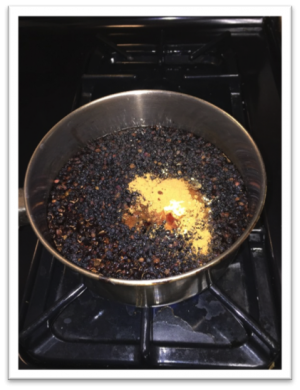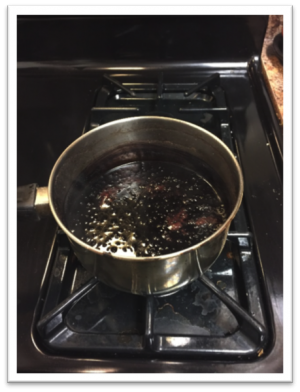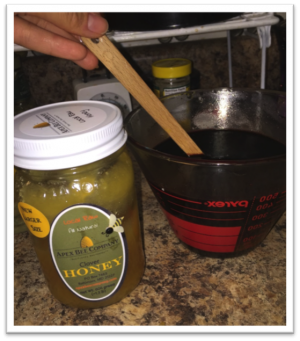
How to Beat the Flu in 48 Hours
Dear Living Well Daily Reader,
“You’re a walking lab experiment!”
That’s what my best friend told me after I gave her the rundown of my recent supplement protocol to beat a cold I had pick up seven days prior.
This bug was a nasty one. In the past, I’ve been able to stop a cold in its tracks within a day or two, sometimes in as little as eight hours. But on day five of this one, I still had sinus pressure, congestion, a runny nose, headaches, and fatigue.
I had been using my regular cold-busting protocol: vitamin C tablets, oregano oil, Airborne, zinc, green vegetable juices, and my secret weapon of medicinal mushrooms: a product called AHCC.
AHCC is no joke. It has remarkable ability to boost the immune system and is used in Japan as an adjuvant cancer treatment. When my sister and mother had the flu last year, I made them both take AHCC. My sister’s fever broke an hour after taking it, and she was back to good in just a day or two.
When my mom took AHCC, within an hour or two, she went from being confined to the couch under the covers to being up and active, taking down Christmas decorations.
Every time I feel a tickle in the back of my throat, have any sinus pressure, or sneeze one too many times, I take a few capsules of AHCC and it stops a cold in its tracks. I also use it when traveling.
But this recent bug was immune to my attempts to squash it.
(I know, I know, a terrible double pun.)
So I opened up my herbal remedy books and looked for something new to try, and there I found it:
Elderberries.
The Science
Elderberries have been used in folk medicine for hundreds of years to treat colds, flu, and upper respiratory tract infections. Now modern research is confirming the wisdom of our ancestors.
Elderberry has shown antiviral activity against H1N1 (swine flu) infection in a test tube study. In fact, it compared in effectiveness to Tamiflu, the prescription drug that may help reduce the duration of the flu.
The dark berries appear to stimulate the immune system, which may be how they help fight the virus. They also have potent antioxidant activity. One in vitro study found that elderberry has stronger antioxidant properties than blueberries, which are known for their high amounts of antioxidants.[1]
In fact, the anthocyanin content of elderberries is the highest of any food measured by the USDA, nearly doubling the amount found in other fruits. Anthocyanins are the flavonoid compounds responsible for giving the berries their deep dark color, and, most importantly, their antioxidant ability.
But there is more than just test tube studies. Three human studies have been done showing that elderberry can reduce the symptoms and duration of the flu.
In one study of 60 people, 15 ml of elderberry syrup given four times a day helped relieve symptoms four days sooner than the placebo. The group given elderberry needed less rescue medication as well.[2]
Another study found that folks given Sambucol, a standardized elderberry extract, had significant improvements in their symptoms within two days. Ninety percent of that group had a complete resolution of their flu within two-three days, whereas the group given a placebo suffered for at least six more days.[3]
In a third study, 64 people were given either four doses of an elderberry lozenge or placebo for two days. By the end of the second day, 28% of the group given the elderberry lozenges were completely recovered from their flu symptoms, and another 60% had a significant relief of symptoms. In comparison, only 16% of the placebo group experienced relief from symptoms, and the rest either stayed the same or got worse.[4]
That was enough evidence for me to give it a try, so I trudged out to my local MOM’s Organic Market to look for some.
I took the 2 teaspoon dose immediately and then again later that evening.
The next morning, day six, I took a dose immediately when I woke up and again at noon. By 3 p.m., I felt 90% better. I continued taking it three times a day for the next few days.
Now, it could certainly have been a placebo effect, or that the cold had just run its course. But my little n=1 experience gave me positive results, so I’m adding this natural remedy to my winter arsenal.
Also, its tastes awesome.
You can easily find Sambucol elderberry syrup at most drugstores, but it’s pricey: You’ll pay almost $1 per dose. If you get hit with the flu tomorrow, it’s worth the expense. But if you want to take as a daily preventative, it’s much more cost-effective to make at home, and it’s very simple. The recipe below (without the spices) ends up being 21 cents per dose.
Homemade Elderberry Syrup
Combine 1/2 cup of dried elderberries and 3½ cups of water in a saucepan and bring to a boil. You can also add spices if you like. I added 2 tablespoons of dried ginger, 1 teaspoon of cinnamon and a 1/2 teaspoon of clove powder.

Ginger, cinnamon, and clove add additional antioxidant and antiviral properties to the syrup.
Bring the mix to a boil and then reduce the heat and simmer for about 25 minutes, until the liquid has been reduced by about half.

Reduce the liquid by half.
Remove from heat and pour through a strainer to remove the solids. Let the liquid cool to lukewarm and add 1 cup of raw honey (use local honey if you can). Stir well.

Honey acts as a natural preservative and also has antibacterial properties.
Store the elderberry syrup in a mason jar or other glass container and keep it in your fridge to extend the shelf life. Honey acts as a natural preservative, but if you notice it start to smell funky or develop mold, toss it.
I plan to take 1 tablespoon syrup daily during the winter months for prevention. If I do catch a bug or virus, I’ll increase the dose to three times a day until the symptoms are gone.
You can also mix it in with green smoothies or hot tea or drizzle it on grain-free paleo pancakes.
Safety and Precautions
Elderberry extract has been studied in humans for 12 weeks with no harmful effects on kidney and liver function, blood lipids, or blood glucose.[5] But due to its ability to stimulate the immune system, people with autoimmune conditions should avoid elderberry unless under the supervision of a trained herbalist or medical professional.
The leaves, stem, bark, seeds, and unripened fruit contain cyanogenic glycosides, which convert to cyanide when consumed, so never eat those parts of the plant unless they have been cooked. Cooking destroys the harmful compounds.
Lastly, if you make your own elderberry syrup, be aware that honey should not be given to infants under 1 year of age.
To living well,

Jasmine LeMaster
Health Researcher
Sources:
[4] Pilot Clinical Study on a Proprietary Elderberry Extract: Efficacy in Addressing Influenza Symptoms
View More Free Articles
Mailbag: The Calcium Mistake That's Hardening Your Arteries
“What type of calcium is best to take with bisphosphonates for osteoporosis? I know some varieties can build up in arteries. Thanks for the help.” —Bone Builder Hi Builder, When a patient asks me about calcium, I ask them a peculiar question in return… “Ever wonder how elephants and giraffes build and maintain their massive...
Doctor-Approved Method to Ditch Blood Pressure Meds
In a world where drug solutions dominate healthcare, it’s refreshing to discover that best remedies sometimes don’t involve a single pill. A groundbreaking study shows simple relaxation techniques could be your secret weapon against one of America’s deadliest health conditions. Best of all? It’s free, easy to start right away—and your results are bound to...
Trouble Hearing? Your Heart Could Be at Risk
With research exploding and data pouring in, scientists are uncovering some weird (and surprisingly helpful) health connections. Today’s odd couple? Hearing loss and heart failure. Turns out your ears and your ticker are more connected than you ever imagined. A major study published in the journal Heart looked at over 164,000 people for nearly a...
Stay Up Late? It Could Destroy Your Mental Health
If you dread mornings but come alive at night, there’s concerning new research you need to know about. A recent study found that “night owls” are at higher risk for depression. But before you rush to set your alarm to get up with the sun tomorrow, there’s more to the story… Chronotypes are essentially your...
Go from Flabby to Fit with this Common Vitamin
If you’re like many of us, you woke up one day, looked in the mirror, and realized you’re no spring chicken anymore. Even worse—when you weren’t paying attention—it seems you somehow misplaced the muscles of your youth and have gone from fit to flabby. Aging has a way of humbling us like that. But scientists...
Seasonal Allergy “Off Switch” Discovered in the GUT
“Doc, why am I suddenly suffering from seasonal allergies when I’ve never had them before?” It’s a question I get all the time—and my answer might surprise you. Stop looking up at the trees—and start looking down at your gut… Your sneezing fits, itchy eyes, and runny nose might have more to do with what’s...
“Canary in the Coal Mine” Test Sniffs Out Brain Issues Early
One of the most common questions I get is how to tell if you’re starting to experience cognitive decline. I get it—losing your memory is scary, especially when it sneaks up on you. But here’s some exciting news that might put your mind at ease. A fascinating new study suggests that your nose might be...
BEAT Stubborn Leg Swelling Without Dangerous Diuretics
“I need help with edema.” —Swollen Hi Swollen, When patients complain of edema—fluid retention that causes feet, ankles, and legs to swell—I explain that, while conventional medicine immediately prescribes diuretic drugs, nature offers us effective solutions we can try first. I’ll share those in just a moment, but first, let’s take a quick look at...
Mental Health Linked to 30% FASTER Aging [6-Step FIX]
Your mind and body are more connected than you might realize—and a groundbreaking new study proves just how profound that connection really is. In fact, it’s this mind-body link that helps explain why battling depression can put you on the fast track to physical decline. Depression is the most common mental health condition worldwide. We’ve...
The Air You Breathe Is Silently Stealing Your Memory
You already know that air pollution damages your lungs. Chances are you’ve heard it can also harm your heart. And I bet you won’t be surprised when I tell you it claims millions of lives annually. But now, alarming new research suggests polluted air might also damage your brain. This study found that long-term exposure...









